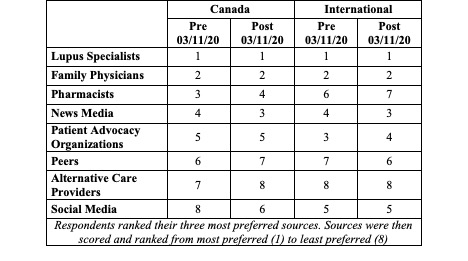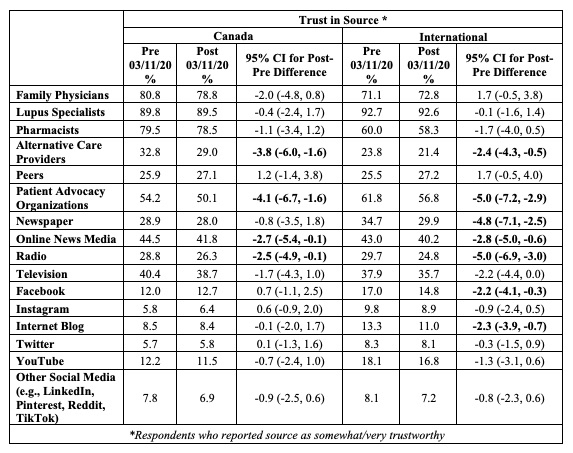Session Information
Date: Sunday, November 7, 2021
Title: SLE – Diagnosis, Manifestations, & Outcomes Poster II: Manifestations (0855–0896)
Session Type: Poster Session B
Session Time: 8:30AM-10:30AM
Background/Purpose: The spread of COVID-19 misinformation is especially serious for individuals with complex diseases like SLE; conflicting and/or unfounded information can complicate a patient’s health decision making and exacerbate stress. We assessed how SLE patients access and trust health information pre and during COVID-19.
Methods: Canadian and international patients fulfilling the ACR or Systemic Lupus International Collaborating Clinics (SLICC) Classification Criteria for SLE were recruited from 15 observational SLE research cohorts, and patients self-reporting SLE were recruited through five patient advocacy organizations. Participants completed an online survey from June 2020-April 2021 regarding the sources of health information they accessed in the 12 months preceding (pre 03/11/2020) and during the COVID-19 (post 03/11/2020) pandemic. We calculated the percentage of patients accessing each source of information, their preferred sources, and the level of trust in each source. McNemar tests were used to compare frequencies pre and post 03/11/2020 in the Canadian and international samples.
Results: 845 Canadian and 1090 international (Asia n=201, Europe n=324, Latin America n=118, US n=447) patients completed the survey (40.4% and 21.0% response rates, respectively); 78.0% were recruited through SLE research cohorts, 92.7% were female, 35.2% reported non-white race/ethnicity, mean age at diagnosis was 32.0 years (SD 13.3) and mean disease duration was 16.6 years (SD 12.0). 76.6% of participants had completed post-secondary education, and 2.1% reported a positive COVID-19 test. Canadian and international patients accessed news media more frequently during vs pre pandemic (44.6% of Canadians accessed sometimes/often/always pre vs 52.1% during; 59.8% of international participants accessed pre vs 68.9% during), while access to family physicians, lupus specialists, pharmacists and alternative care providers decreased in both samples during the pandemic (Table 1). Lupus specialists and family physicians were ranked the most preferred information sources (Table 2) and considered the most trustworthy (Table 3) pre and during the pandemic. News media was more preferred post vs pre 03/11 (Table 2), yet was considered less trustworthy in Canada (44.5% rated online news media as somewhat/very trustworthy pre vs 41.8% post) and internationally (43.0% pre vs 40.2% post) during COVID-19 (Table 3). In both samples, patient advocacy organizations were accessed less frequently pre and during COVID-19 than other less preferred and trusted sources (e.g., peers, social media), and trust in advocacy organizations decreased during the pandemic in both Canadian and international samples by 4.1% and 5.0%, respectively.
Conclusion: Although lupus specialists and family physicians were ranked as the most preferred and trustworthy health information sources, patients accessed these sources less frequently during the pandemic and accessed news media, a less trusted source, more frequently. To increase accessibility to preferred and trusted sources, virtual visits should be promoted where not already in place. This research will improve existing information dissemination pathways valued by SLE patients.
To cite this abstract in AMA style:
Cardwell F, Elliott S, Choi M, Chin R, St.Pierre Y, Rowbottom L, Urowitz M, Ruiz-Irastorza G, Bernatsky S, Petri M, Manzi S, Peschken C, Ramsey-Goldman R, Fortin P, Shin J, Bae S, Cho J, Mak A, Hanly J, Askanase A, Romero-Diaz J, Nieto R, Pons-Estel B, Bruce I, Wallace D, Clarke A. Health Information Use by SLE Patients Pre and During COVID-19 [abstract]. Arthritis Rheumatol. 2021; 73 (suppl 9). https://acrabstracts.org/abstract/health-information-use-by-sle-patients-pre-and-during-covid-19/. Accessed .« Back to ACR Convergence 2021
ACR Meeting Abstracts - https://acrabstracts.org/abstract/health-information-use-by-sle-patients-pre-and-during-covid-19/



